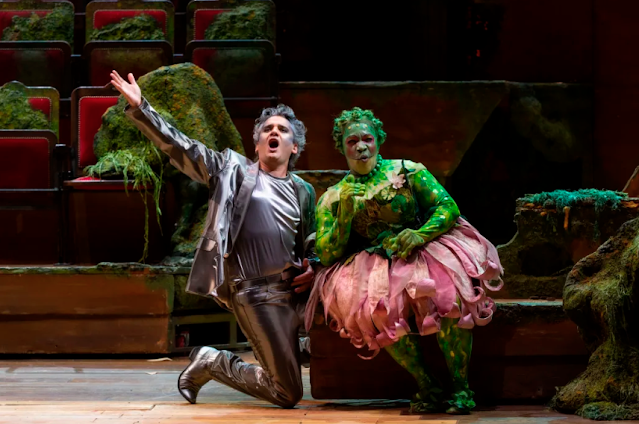Rameau - Platée
ONP Garnier, Tuesday June 21 2022
Conductor: Mark Minkowski. Production and Costumes: Laurent Pelly. Sets: Chantal Thomas. Lighting: Joël Adam. Choreography: Laura Scozzi. Thespis: Mathias Vidal. Un satyre, Cithéron: Nahuel di Pierro. Momus: Marc Mauillon. Thalie, la folie: Julie Fuchs. L'amour, Clarine: Tamara Bounazou. Platée: Lawrence Brownlee. Jupiter: Jean Teitgen. Mercure: Reinoud Van Mechelen. Junon: Adriana Bignagni Lesca. Chorus of the Opéra National de Paris. Les Musiciens du Louvre. |
| Photos: Guergana Damianova/ONP |
Preparing to write this post about the Paris Opera's current revival of Laurent Pelly's near-legendary production of Platée, I was surprised not to find it already described somewhere on my blog. I know I did write it up: I still remember struggling to explain how the set, rows of theatre seats one above the other, breaks up and moulders away into the marshes as the evening progresses. But it must have been back in the days when websites sometimes inexplicably (unless deliberately hacked) crashed and exploded, and I guess the article was lost. As the present blog goes back, explosion-free, to March 2003, that means - eek! - it's nearly twenty years since I last saw the production, one of Pelly's most brilliant and detailed.
It was an absolute treat to see it again, still bright as a button after all this time, and we (there were three of us) wondered in just how many instances (or probably more correctly, how few) other works in the operatic repertoire offer two-and-a-half hours of sheer, unadulterated entertainment to such a brilliant, inventive and often surprising score. To drag out a cliché, clichés often being quite truthful, useful things, there's never a dull moment from start to finish. Platée is one of Rameau's most engaging and extraordinary works.
I'm not going to describe the production in detail again, but anyone not already familiar with it who'd like to take a look can find a 2002 video, with Paul Agnew, Mireille Delunsch, Yann Beuron, Vincent Le Texier, Doris Lamprecht, Laurent Naouri, Valérie Gabail and Frank Leguérinel in very decent picture quality on YouTube, and I've added it at the end of this post.
Having been enthralled all evening, ideally seated near the middle of on the fourth row, I'm not, either, going to nitpick my way through the cast, comparing their performances in detail with what so enthralled me twenty years ago. I will say, though, that I really missed the cheeky comic and vocal charm of Yann Beuron, who back then sang both Thespis and Mercure, that Jean Teitgen was an excellent, resounding Jupiter and that Marc Mauillon was an almost equally satisfactory Momus. Their diction made supertitling superfluous.
Julie Fuchs, the current 'owner' of the extensive, complex role of La Folie in this production, is less stark-staring-bonkers than Mireille Delunsch, but La Folie's successive numbers aren't limited to high jinks and fireworks: she has to demonstrate how, having stolen Apollo's lyre and with her supreme artistry, she can 'make even happiness sad', and Fuchs sang those more lyrical, minor key passages with a seductive timbre, less edgy than Delunsch's and melting phrasing. While the whole evening was at such a high standard, you could hardly say there were highlights at all, but her wonderful call to Hymen - a 'coup de génie', as she herself puts it - where she's joined by the baritones and the chorus, was one. (Earlier, the furious storm, in which the Musiciens du louvre were just phenomenal, was another.)
When this season's schedule came out last year, I should think nearly everyone was surprised to find Lawrence Brownlee cast as Platée. As far as I could ascertain from an omniscient expert in such matters, he'd never sung Rameau or even 'baroque' works before, and I know from a friend who's done it how hard the switch is from Italian bel canto to France's 17th-century repertoire, with its different demands and intentions, so focused on the word. Various people have now asked me specifically how Brownlee got on. Well, his certainly isn't the 'French sound' we may have come to expect with the re-emergence of the works of the period over the last 50 years (it's funny how much his occasional 'fioritures' sound like Rossini - but was that only because we knew who he was and where he was coming from?) but my French friends were astounded by his diction, prosody and the degree to which he nevertheless absorbed the stylistic requirements of a repertoire he hasn't frequented before.
It was perhaps less surprising to discover he's such a good comic actor. Once the prologue's over, Platée is on stage most of the time, and the demands of Pelly's in-detail characterisation of the role must be exhausting over the two-hour stretch, but he pulled it off to loud applause and even something of a standing ovation - as I've often said, a rarity in Paris.
Just as I wondered, above, how many comic works of this standard - action and music - there are in the operatic repertoire, I was recently wondering 'aloud', so to speak, on a blog far more famous than mine, how many (or again, how few) operas might be thought near-perfect. The great Platée is, to me, surely one. What better way could there be to spend the evening of France's Fête de la Musique?
Here's the 2002 video:






Comments
Post a Comment